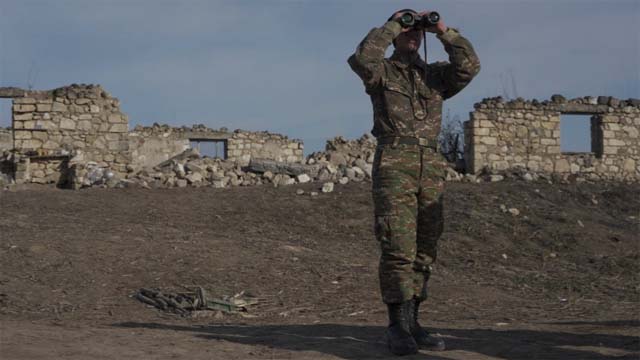
About 10 kilometres from the border with Azerbaijan in the northeastern Tavush region, locals parked their cars across the road, shouting as they set up tents along the winding mountain pass to block the traffic.
They included 96-year-old Lena Ghardashyan.
“We will not give up even one centimetre,” she told AFP at the roadblock.
“We will shed blood, but we will not give up. At my age, I will go on my knees, but I will not give up.”
The protesters are hoping to thwart Armenia’s plans to return control of four abandoned Azerbaijani villages — seized during the 1990s — as part of wider talks on securing an elusive peace deal with Baku.
The two Caucasus rivals have been locked in tension and bloody conflict since the break-up of the Soviet Union more than three decades ago.
They fought two wars — in the 1990s and 2020 — for control over Nagorno-Karabakh, territory internationally recognised as Azerbaijan’s but controlled for 30 years by Armenian separatists.
Baku recaptured it in a lightning offensive last September, and talks over a broader border agreement have since intensified.
– ‘Serious threat’ –
The two sides started physical work to delimit part of the border earlier this week, triggering a new wave of protests across Armenia that spread to the capital Yerevan.
Locals in settlements near to those being handed back say they could end up cut off from the rest of the country.
They accuse Armenian Prime Minister Nikol Pashinyan of unilaterally giving away territory without any guarantees in return.
“People realise that the solutions offered by our authorities today pose a serious threat to the locals’ daily lives and existence,” said Hovik Beranyan, a 31-year-old protester from the village of Kuti.
Demonstrators this week have also blocked a major highway leading to Georgia — a vital trade route for landlocked Armenia — and streets in the capital Yerevan.
“We are fighting specifically for our land and our water, we want our land to stay as it is,” said driver Eghish Maghsudyan from Voskepar, a village the locals say will be cut off by the land transfer.
The region where Armenia has agreed to hand back some villages is of strategic importance.
Along with sections of the highway to Georgia, it is also near a Russian gas pipeline and has advantageous military positions.
– ‘Prevent a war’ –
Pashinyan — a former opposition lawmaker who swept to power in 2018 in a bloodless revolution — has defended his decision in the face of protestors.
“To get what legitimately belongs to Armenia, we must be ready to cede what is not legitimately ours,” he said during a mid-March visit to Voskepar.
“Our policy is to prevent a war,” he said.
Azerbaijani President Ilham Aliyev said Tuesday a peace deal between the countries was “closer than ever before”.
Several countries, including Russia, the United States, Iran, France and Germany, have all tried to mediate between the two countries in search of a lasting solution.
Analysts say Moscow’s historic influence in the region has waned amid its war in Ukraine.
Fears of a renewed conflict continue to run high.
Both sides have unsettled territorial claims and shootouts between soldiers stationed on the border are frequent.
But protestors insist they will not back down.
“We will fight to the end for our land,” protestor Shaliko Yeghiazaryan told AFP.
“Every centimetre of our historic land belongs to us. ”






